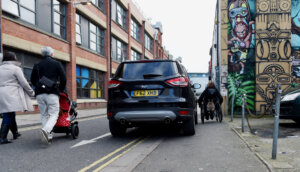Campaigning NE pensioner welcomes pavement parking ban plan
Written by Amelia Anderson on 9th October 2025

Pavement parking causes safety problems for many people, not least the visually impaired and physically disabled. Here, a wheelchair user struggles to pass by a badly parked car on the pavement and double yellow lines.
A Northumberland pensioner who took her local MP on a ‘blindfold walk’ to highlight the dangers facing visually-impaired people has welcomed news of a possible national ‘pavement parking’ ban.
Joyce Anderson, 80, who is visually impaired, has been campaigning with the Royal National Institute for the Blind (RNIB) for safer streets for years and said: “I would love pavement parking to be banned.
“When cars are parked on the pavement, the wing-mirrors hit my arm and when white vans are parked there, their wing-mirrors are exactly the right height to hit me in the face.”
Mrs Anderson took her local MP, Ian Lavery, on a ‘blindfold walk’ – where he was blindfolded and taken on a guided walk to simulate the feeling of being visually impaired – around Morpeth, her local town, to show him the obstacles she faces daily, including cars parked on the pavements.
She added that the hazard isn’t just the cars on the pavement, saying: “It’s the chaos they leave behind when all the curbs and paving stones are raised at a funny angle; it makes it very difficult to walk.
“I am a long cane user, and it gets caught in the raised paving stones, so I get repetitive strain injury in my wrist.”
Mrs Anderson’s comments come as the government is considering introducing a law to ban pavement parking, after organisations representing visually impaired people demanded change.
Pavement parking is banned in Greater London and Scotland, but the law could be introduced nationwide.
Boris Johnson’s government launched a consultation on pavement parking in 2020 and now Labour Transport Minister Lilian Greenwood has confirmed they are reviewing responses to the consultation and “considering the best way forward”.
Guide Dogs UK argue that the ban would be beneficial to visually-impaired people, parents with prams and wheelchair-users, and have created the Streets Ahead campaign, which focuses on making public places more accessible for visually-impaired people, including cars parked on pavements.
The charity found that 81% of people with sight loss said that reducing obstacles on pavements was important to improving their quality of life and four out of five said that pavement parking makes it difficult to walk on the pavement at least once a week.
They highlight the safety risk of pavement parking because often people with a visual impairment must risk their lives by walking into the road to get past a car parked on the pavement.
However, the ban could also mean people would not be able to park outside their homes and could be landed with a penalty charge, while for some motorists on narrow roads, pavement parking is the only way to avoid blocking traffic.
A Sunderland University film student said she wouldn’t be happy with the ban: “I live on a back street, not a lot of us have driveways: it would be pretty impossible.”
Sunderland University students who spoke to Spark on the issue said that the price of parking at the university forces them to find other places to park.
“I don’t park in the university car park; I park on a curb because the university charge £6.40 for a day,” said one. “Maybe if they lowered the prices then I’d park there.”
Motoring organisation the RAC has also backed the idea of a ban and Simon Williams, head of policy, said pavement parking was “at best inconvenient and at worst hazardous”.
A Sunderland sports journalism student said alternative places to park needed to be provided if the law is introduced. “You can’t ban it without something else in place, it sounds like a logistical nightmare.”







